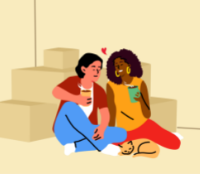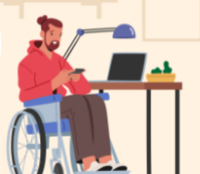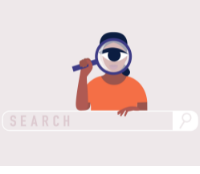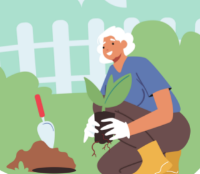Supporting friends and families who have been affected by child exploitation
Child exploitation (CE) is a term used for children harmed and abused outside of the home (but by people in their community) and may include online sexual abuse, sexual abuse and involvement in criminal activities.
People who are skilled at manipulating, controlling and coercing children target them for criminal acts. Children may not understand or recognise what is happening to them or may be too frightened, confused or ashamed to talk about it.
The impact of child exploitation can leave families feeling vulnerable, frightened, angry, isolated and powerless. It is a complicated crime and can affect families in many ways.
How you respond as a friend, family member or neighbour can greatly affect a family’s ability to cope in a very difficult and complicated situation.
How you can help?
Listen without judgement

For families affected by these crimes it can be very confusing, scary and frustrating. Parents and carers may experience many changeable emotions such as desperation, anger, grief and hopelessness- this is an understandable response to a very difficult situation.
If a parent, carer or child has trusted you enough to share the difficulties they are experiencing, you can really help by listening without judgement. You can do this by allowing them to choose what they want to tell you and reassuring them that they do not have to talk about anything they do not want to. It is helpful if you do not ask questions about why this happened or blame them, but instead, recognise that this was not their fault.
At Ivison Trust we are very clear that child exploitation happens because a child crosses the path of somebody who is skilled at abusing children.
Your friend or family member may only tell you a small part of the difficulties that they are facing. They may be distrustful, trying to protect you, fearful of feeling exposed, unable to put into words their experiences or be trying to be respectful towards their child’s personal and sensitive information. The more respectful and supportive you are, the more likely they will be able to see you as a trusted person.
Whilst it is understandable that you may upset or angry that this has happened, it is important that you don’t direct your emotional response at the affected child or parent that this has happened to, as they are already coping with traumatic events.
Believe in

Don’t underestimate how empowering it can feel for a parent or carer to have someone who cares about and is there for them. Whilst a parent or carer may have many difficult emotions, simply by listening to them, you are already sharing the burden and giving them greater headspace to find solutions.
It may be tempting to try to tell them what you would do if it happened to you, or to try to find solutions, but this is likely to be unhelpful because it has not happened to you.
The parents/carers and child may be experiencing conflict in their relationship due to exploiters attempts to undermine this relationship as well as the child’s confusion about the situation which may make them angry and blaming towards their parent. It is important to understand that the more the parent/child relationship is supported, the more likely there will be better outcomes for the child.
It may be helpful to remind those affected of their strengths, which they may find difficult to remember in the current situation, or of how their relationship or child was before the exploitation.
Keep in contact

It may be that your family member or friend may withdraw from you. They may not want to come to family gatherings, socialise or respond to your calls or texts. This is not personal to you, but their way of coping with a lot of difficult experiences and emotions.
The exploitation of a daughter or son can be a very isolating experience and you can really help by keeping in contact with no expectations or need for them to respond. You can send texts, cards, flowers or cakes to let them know that you are thinking of them, or that you are there if they need you. It matters that you care. Trust that when they can, they will get back in contact.
Understand
 Child exploitation is a complicated crime and there may be many challenges to keeping a child safe for the parent and safeguarding agencies such as the police, social care and schools. If you would like to develop your understanding of child exploitation there are many resources that may help-
Child exploitation is a complicated crime and there may be many challenges to keeping a child safe for the parent and safeguarding agencies such as the police, social care and schools. If you would like to develop your understanding of child exploitation there are many resources that may help-
Take our child sexual exploitation e-learning
Read up about child sexual exploitation and criminal exploitation
Watch and share our Spotting the signs video
Join a free webinar
Timescales
 The effects of child exploitation can be traumatic and long lasting and those affected will need to find their way of coping and recovering. Those affected by this crime will have been under many pressures that may have affected their physical and mental health and their trust in the world. There may be good days and bad days. Even if the exploitation stops, it may take time for a person to recover. Your patience, belief in them and understanding is an invaluable support.
The effects of child exploitation can be traumatic and long lasting and those affected will need to find their way of coping and recovering. Those affected by this crime will have been under many pressures that may have affected their physical and mental health and their trust in the world. There may be good days and bad days. Even if the exploitation stops, it may take time for a person to recover. Your patience, belief in them and understanding is an invaluable support.
.
Practical steps
 Families affected by child exploitation may be struggling with many issues and it may be helpful to ask ‘how can I help, what do you need?’ Supporting a parent with childcare, or letting them talk through the main points they want to raise in a child protection meeting, attending a safeguarding meeting with them as an emotional support, searching for information or resources, even offering to take the dog out! All these could be supportive. Talking to your friend or family member about their needs and looking after themselves can be helpful.
Families affected by child exploitation may be struggling with many issues and it may be helpful to ask ‘how can I help, what do you need?’ Supporting a parent with childcare, or letting them talk through the main points they want to raise in a child protection meeting, attending a safeguarding meeting with them as an emotional support, searching for information or resources, even offering to take the dog out! All these could be supportive. Talking to your friend or family member about their needs and looking after themselves can be helpful.
Child exploitation can leave children and parents feeling very disempowered as offenders take control of a child’s life, so whatever you do to help, make sure that you’ve checked whether your friend or family actually wants you to do this.
Seeking outside help
 If a child under 18 years is being harmed, it is important that you encourage the parent to seek immediate safeguarding support from the police or social care to stop further harm. There are many other projects that can offer further support such as pace, counselling and therapy services and young people’s projects.
If a child under 18 years is being harmed, it is important that you encourage the parent to seek immediate safeguarding support from the police or social care to stop further harm. There are many other projects that can offer further support such as pace, counselling and therapy services and young people’s projects.
.
.
Look after yourself
 It may be difficult for you to hear your friend or family member’s situation and it is helpful for you to consider how you look after yourself during this time by doing things that you enjoy- such as going for a walk, meditating or watching a film.
It may be difficult for you to hear your friend or family member’s situation and it is helpful for you to consider how you look after yourself during this time by doing things that you enjoy- such as going for a walk, meditating or watching a film.




